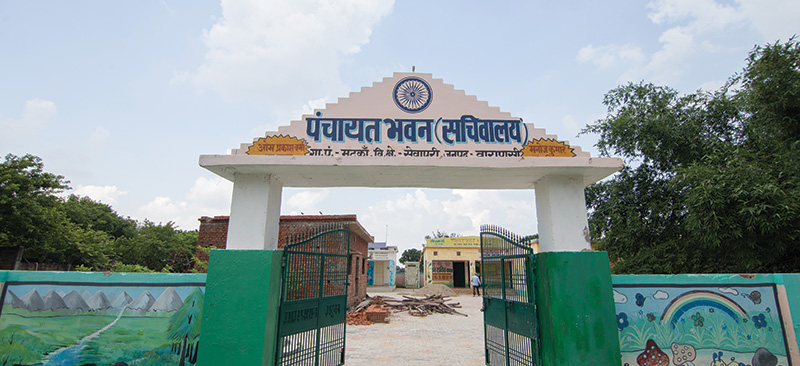
MSC supported the district administration of Varanasi in India’s Uttar Pradesh state to implement and monitor the unique gram panchayat-level saturation program called “Sewapuri Vikas Abhiyan (SeVA).” MSC set up a full-time program support unit (PSU) that comprised development sector professionals. The team reviewed the on-ground situation and consulted relevant government ministries and departments, development partners, and sector experts to gather critical insights and support the implementation.
MSC developed strategic plans for the five sectors in focus—health, education, nutrition, sanitation, and financial inclusion. We developed detailed action plans and designed a monitoring, evaluation, and learning (MEAL) framework to monitor and evaluate key performance indicators (KPIs) regularly. We developed the Abhiyan’s communication plan and a note with key principles and approaches to transform the Abhiyan into Jan Andolan—a people’s movement. The team supported development partners to train, hand-hold, and increase their community outreach through a cadre of SeVA volunteers and submitted periodic reports with the analysis of KPIs and qualitative observation.
The Sewapuri Vikas Abhiyan made tremendous progress in infrastructural development, beneficiary enrolment, training and capacity building, health promotion, disease prevention, and change in the local population’s behavior. It impacted more than 230,000 lives. It transformed more than 34 community health centers into health and wellness centers and improved the infrastructure of more than 124 governments through the introduction of smart classes. It built public convenience facilities, such as community toilets, gram panchayats, and Common Service Centres in all the gram panchayats. It led to increased enrolments under the multiple welfare programs run by the government.
The NITI Aayog commissioned the project with funding from the Bill & Melinda Gates Foundation (BMGF).
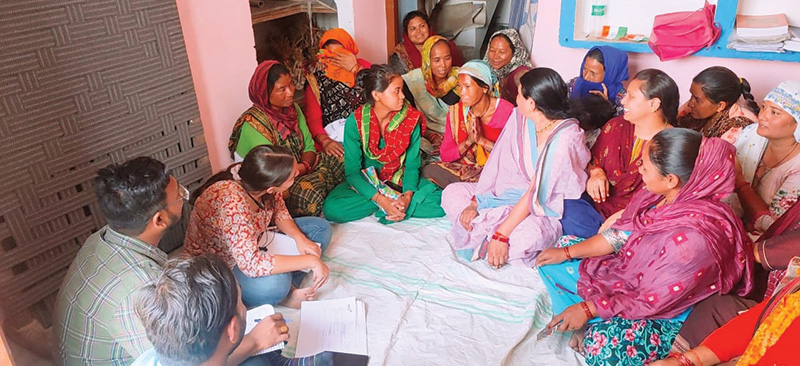
MSC has been working on four key work streams to increase financial inclusion across four Indian states, Uttar Pradesh, Odisha, Madhya Pradesh, and Bihar, under the PFICP project. MSC engaged with State Rural Livelihoods Missions (SRLMs) and National Rural Livelihoods Mission (NRLM) to provide technical assistance to scale financial inclusion initiatives. MSC facilitated partnerships between SHGs and new generation, technology-led financial service providers from the private sector to support SHGs to offer their users a broader choice of financial products. We also extended support for digital literacy and behavior change communication. We built the capacities of SHG women to adopt and use digital channels for financial services.
We supported Uttar Pradesh SRLM to select 56,875 BC sakhis within six months. This resulted in financial services for around 42 million rural people. The operational BC sakhis have already facilitated around 2.3 million transactions with a flow of USD 69 million (INR 5.2 billion).
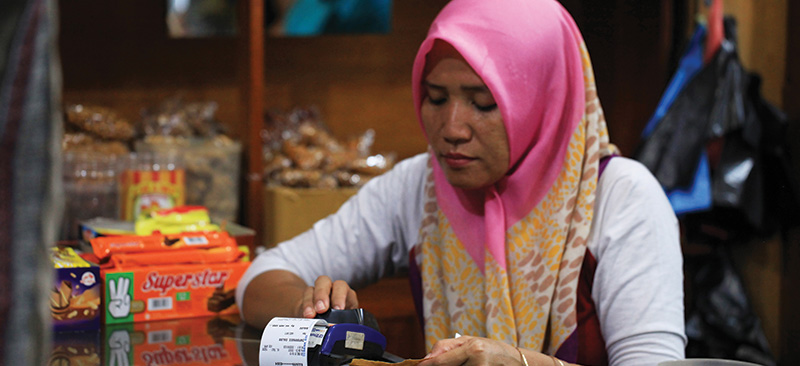
MSC collaborated with the Secretariat for National Financial Inclusion (SNKI) to design an e-KYC pilot and provide operational support to implement it. Alongside the pilot design, MSC helped the banks and government ministries document processes, develop monitoring and supervision protocols, build staff capacities, and conduct concurrent evaluations to refine the processes.
MSC also developed a roadmap after the e-KYC pilot was completed. The roadmap process included consultations with industry players, such as the Ministry of Home Affairs (MoHA) and SNKI, documentation of the guidelines to implement e-KYC across different financial service providers, and the development of a process to enable access for different FSPs to e-KYC infrastructure. We also evaluated the e-KYC rollout and shared the findings through blogs and policy briefs to benefit the industry.
The insights from the pilot enabled the Directorate of Population and Civil Registration to develop and enhance its product and service offerings for the financial services industry. The pilot would yield valuable data to inform policy in Indonesia and guide financial inclusion and social transfer initiatives.
The Bill & Melinda Gates Foundation commissioned this project.
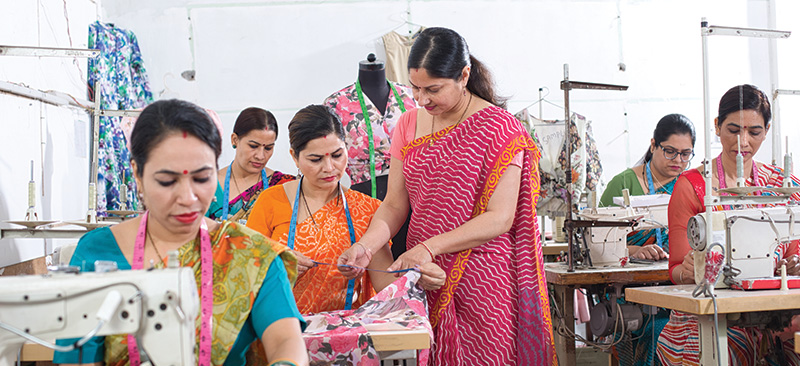
MSC supported RBS-FI, Dia Vikas, and Rabobank Foundation to build robust and creditworthy MFIs in India. We conducted multiple technical assistance programs to provide handholding support to microfinance institutions (MFIs) to build capacity, map processes, and develop product. Our support also included market research, HR and risk management, documentation and dissemination, internal audit and control, strategic business planning, business and private financing, and pilot testing, among other areas.
We developed and successfully implemented various training programs and toolkits in partner MFIs. We supported more than 50 MFIs to scale up their operations and improve operational efficiency.
The MFIs became more comfortable accessing funds. We also supported the MFIs to develop a robust risk management system, and increase the number of loans to unbanked communities.
Dia Vikas, one of the program funders, described the program as “an extraordinary success that would have been impossible without MSC’s dedication, professionalism, and technical capacity.”

MSC supported Bangladesh Post Office and Bank Asia to ensure resilience and a sustainable livelihood for post banking agents. This project intended to use Bangladesh Post’s digital post e-centers’ initiative to improve the low-and-moderate-income segment’s (LMI) financial health.
MSC helped Bank Asia develop channels, build capacity, marketing and communications, and supervision and evaluation. The overarching goal was to solve two fundamental and interconnected problems:
- Post banking agents’ livelihood and income generation: 8,500 post e-center agents across Bangladesh earn less than USD 115 per month from the existing postal services. They need to be sustainable to serve thousands of rural LMI customers effectively.
- Financial services to build the LMI segment’s financial resilience and health: Millions of Bangladeshis live in rural areas and do not have access to the right financial solutions for their needs. Banks struggle to serve them due to high costs. They need access to appropriate financial services from a nationwide agent network, which is particularly convenient for female customers.
MSC conducted the post banking operations’ diagnostic and found infrastructural challenges and room for improvement in the post banking agents’ capabilities. MSC helped the bank agents develop the infrastructure and improve agent capacity through training and refreshers. MSC also supported Bank Asia to promote the channel through marketing communication and an agent comic book. Our current work also includes the revision of the incentive structure for the post banking agents’ channel development.
As a result of MSC’s interventions, Bank Asia onboarded 192,000 new customers, with 58% women. It also provided remittance for 1,750 agents and credit services beyond basic banking services. 22% of customers also received credit from these post e-center agents.
MetLife Foundation commissioned this project.
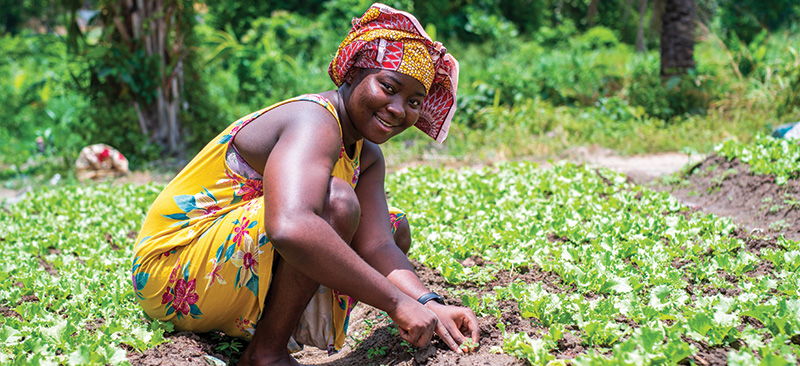
Smart Nkunganire System (SNS) is a public-private partnership (PPP) between BK TecHouse and the Rwanda Agriculture and Animal Resources Development Board (RAB). The Rwandan government uses the system to distribute subsidized seed and fertilizer to more than 1,000 agri-dealers and serve more than 1.2 million smallholder farmers. The platform digitizes the agriculture input supply chain through the subsidy program stakeholders’ database. It monitors the agri input demand or supply at all levels, creates transparency and efficiency, and generates relevant analytics to ease decision-making processes. This promotes a green economy via cashless payments and unlocks access to agriculture insurance and financial services for smallholder farmers in Rwanda.
The platform had limited capabilities. It could not support its commercial viability. In this regard, BKTecHouse sought support from the Bill & Melinda Gates Foundation (BMGF) to enhance the platform’s use cases and commercial viability. MSC helped BK TecHouse enhance SNS’s capabilities through a project that had two phases: i) Landscaping of Rwanda’s digital agriculture ecosystem and technical backstopping to facilitate the project design; ii) Grant proposal refinement to expand the SNS digital platform.
MSC helped assess Rwanda AgTech and FinTech players’ landscape in the engagement phase. We developed an investment roadmap for SNS to increase its reach and impact. Further, we designed a standard approach and tool to identify and qualify potential partners.
MSC also developed a partnership assessment framework and supported the first round of partner assessments with two target partners, which included the ISDA. Lastly, we facilitated workshops with about 30 critical stakeholder groups to identify partnerships and explore opportunities for engagement with the expanded SNS digital platform.
The Bill & Melinda Gates Foundation commissioned the project.





